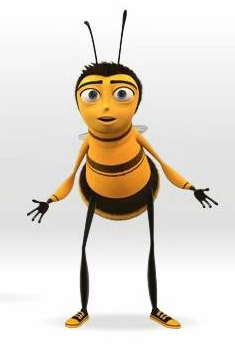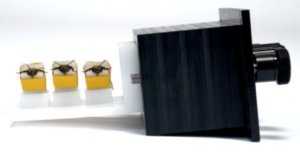
I have a headache! Mind you, I am not trying to figure out what is the meaning of life, nor am I pondering about the profound fact of whether life is worth living. I just bought a book for that question, not that I expect to find the answer there but no doubt I will read it because I was out US $15 paying for it.
No, I have a headache because of bees. No, more precisely, because of what I learned about bees from the news! I was forced to think so hard about these bees, my head hurts all morning even today. "New homeland security buzz: Bomb-sniffing bees" was the headline of a news article posted on line two days ago. That sure got my attention. The story highlights were:
• Scientists train honeybees to sniff out explosives from dynamite to C4
• Researchers say bees could spot car bombs, IEDs, suicide bombers' belts
• When a bee finds explosives, it sticks out proboscis, the tube it uses to sip nectar
• Similar research done with wasps in past, but scientists say bees do better
Hmmm... I don't know about you, but I was quite curious about this and wanted to know more. So what was the buzz all about?
After digging a bit more about this intrigue, my old memory rushed back with a vengeance. This is the kind of research I used to be involved with, not the exact same kind, but having the same flavor, that was being sponsored by a mighty US federal government that controls a huge annual budget that can be renewed yearly with ease. In particular, part of this bee research was/is sponsored by a famed branch of federal research agency named Defense Advanced Research Project Agency (DARPA.) Trust me, if you have any most outlandish, never heard of, out of this world, weird, inconceivable, unbelievable, far fetched idea to promote, you probably have a very good chance to get funding from DARPA. I know, I've been there, done that. I am not talking about chicken feed here. I am talking about BIG BUCKS, with lots of zeros in the check you'd receive monthly to do the proposed research. The kind I did was too embarassing to recount so I will spare you, and especially myself the embarassment for the explanation. So, let's just get to the honey bees.
As it is now the in thing in the US: preoccupation with terrorism and the like, it is not surprising to see this news coming from a prominent US weapons laboratory. With the aid of DARPA, this laboratory worked hard to train bees to sniff out explosives. Although I am not privy to the original proposal for this research, I am sure it contained something like this "This project could have far-reaching applications for U.S. homeland security and the Iraq war."
Here is an excerpt from the news article, used here in the context of "fair use" so I do not have to ask permission for reproduction:
"Researchers at the Los Alamos National Laboratory in New Mexico said they trained honeybees to stick out their proboscis -- the tube they use to feed on nectar -- when they smell explosives in anything from cars and roadside bombs to belts similar to those used by suicide bombers. The results of this Stealthy Insect Sensor Project was published a few days ago, on November 27, 2006.
By exposing the insects to the odor of explosives followed by a sugar water reward, researchers said they trained bees to recognize substances ranging from dynamite and C-4 plastic explosives to the Howitzer propellant grains used in improvised explosive devices in Iraq.
"When bees detect the presence of explosives, they simply stick their proboscis out," said one of the research scientist of the lab who is the project's PI (principal investigator.) These findings followed 18 months of research at the U.S. Energy Department's Los Alamos facility, the nation's leading nuclear weapons laboratory.
They said the bees could be carried in hand-held detectors the size of a shoe box, and could be used to sniff out explosives in airports, roadside security checks, or even placed in robot bomb disposal equipment; and that the next step would be to manufacture the bee boxes and train security guards in their use."
Lo and behold, I found another company (http://www.inscentinel.com) that seemingly is in a more advanced state of affair. It is not American, but British! I am quite surprised to see that these two works do not reference each other. Apparently, the British company already has a prototype called "vapour detection instrumentation" that holds trained bees in a "safe" and "controlled" environment, which can be operated in a range of external environmental conditions. Sample air is delivered to the bees for recognition of specific odours. The bees are held in a special cassette and specially designed hardware and image recognition software monitors and records detection by the bees, converting their response into an electronic form. The electronic output can be given in a simple yes/no, green light/red light form.

From this small image, I hope you can see, so you can commiserate, how the bees are being treated! This seems to be worse than the French's cruel and unusually harsh treatment of geese for their "foie gras," or that of the veals. Although I did not spend anytime looking into this, I am sure that the recognition software they talk about is to catch the bees when they stick out their tongues.
I remain very skeptical about all this, knowing how DARPA works, so I did what came naturally, buzzing around the internet and look what I found in 2 minutes...
http://jeb.biologists.org/ which publishes on line articles from "The Journal of Experimental Biology." This is a LARGE organization with scientists from various countries such as Switzerland, Canada, the UK etc... so I think what they say may be very believable, and what one of their research project says is this: "FRUIT FLIES STICK OUT TONGUE TO BREATHE."
This study was about the question whether small insects like fruit flies, bees etc... breathe (or ventilate, speaking scientifically) and if they do, how. Its conclusion is that they do breathe, by sticking out their tongues, using them as pumps.
To me, this casts a giant shadow on the bee research. Could it be that these poor bees, when exposing to weird air environment, were simply suffocated and they were trying their best to BREATHE? If I were one of these bees inside my box at an airport, and they stick some shoes from some guys up my nose, I will stick out my tongue and that is no explosive that I smelled!
I am going back to my research mode and submit a new proposal to DARPA. Stay tuned as I will publish my research results here!



No comments:
Post a Comment